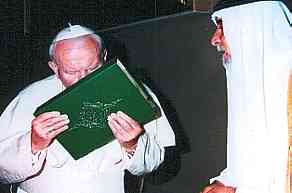To: Wpin
From the Catholic church's own catechism .......
"Outside the Church there is no salvation"
846 How are we to understand this affirmation, often repeated by the Church Fathers?335 Re-formulated positively, it means that all salvation comes from Christ the Head through the Church which is his Body:
Basing itself on Scripture and Tradition, the Council teaches that the Church, a pilgrim now on earth, is necessary for salvation: the one Christ is the mediator and the way of salvation; he is present to us in his body which is the Church. He himself explicitly asserted the necessity of faith and Baptism, and thereby affirmed at the same time the necessity of the Church which men enter through Baptism as through a door. Hence they could not be saved who, knowing that the Catholic Church was founded as necessary by God through Christ, would refuse either to enter it or to remain in it.336
They claim there's an exception for what they refer to as *invincible ignorance* but that disqualifies people who have heard Catholic church claims of being the one true church.
847 This affirmation is not aimed at those who, through no fault of their own, do not know Christ and his Church:
Those who, through no fault of their own, do not know the Gospel of Christ or his Church, but who nevertheless seek God with a sincere heart, and, moved by grace, try in their actions to do his will as they know it through the dictates of their conscience - those too may achieve eternal salvation.337
Basically, this leaves the door wide open for anyone to be saved without Christ. Even their pope has recently stated that atheists can be saved if they live right.
Then there's this tidbit about islam and muslims with the pope kissing the Koran.
http://www.vatican.va/archive/ENG0015/__P29.HTM
841 The Church's relationship with the Muslims. "The plan of salvation also includes those who acknowledge the Creator, in the first place amongst whom are the Muslims; these profess to hold the faith of Abraham, and together with us they adore the one, merciful God, mankind's judge on the last day."330

If you choose to join the Catholic church, do it with eyes wide open.
I was raised Catholic and after I committed my life to Christ could not stay in the RCC. And for that I have been lambasted. You can see the comments yourself.
Some people choose to stay and that's their decision between them and God.
62 posted on
02/20/2015 6:00:27 AM PST by
metmom
(...fixing our eyes on Jesus, the Author and Perfecter of our faith...)
To: metmom
847 This affirmation is not aimed at those who, through no fault of their own, do not know Christ and his Church:
Those who, through no fault of their own, do not know the Gospel of Christ or his Church, but who nevertheless seek God with a sincere heart, and, moved by grace, try in their actions to do his will as they know it through the dictates of their conscience - those too may achieve eternal salvation.337
____________________________________________________________
Why, if this is the case, should we go and spread the good news? If “good” atheists are in we will just ruin eternity for them if we share the good news with them. It is better to die a good atheist who has never than a good person who has heard the Gospel and politely declines.
65 posted on
02/20/2015 6:03:46 AM PST by
Gamecock
(Joel Osteen is a minister of the Gospel like Captain Crunch is a Naval line officer.)
To: metmom
They claim there's an exception for what they refer to as *invincible ignorance* but that disqualifies people who have heard Catholic church claims of being the one true church.I don't know what you think "invincible ignorance" is, but a person who HAS heard what the Catholic Church claims or teaches CAN be invincibly ignorant.
To: metmom
While writing
my last post, which quoted your post here, I reread a part:
[You quote,] Hence they could not be saved who, knowing that the Catholic Church was founded as necessary by God through Christ, would refuse either to enter it or to remain in it.336
[You write,] They claim there's an exception for what they refer to as *invincible ignorance* but that disqualifies people who have heard Catholic church claims of being the one true church.
"Knowing" is not "hearing," though. In other words, I'd distinguish between knowing about a claim and knowing that it's true. I may hear a Saudi cleric's claim that the sun revolves around the earth, but I don't know his claim to be true, heh. If I "knew" everything that I've heard, then what I "knew" would be a seething mess of contradictions.
If hearing were knowing, everyone who heard the gospel would know the gospel. Yes, I know (no pun intended) that "knowing" covers a range of meanings. (Some languages, such as French, Spanish, and German, have at least two words where English has one.) But I doubt that every hearer of the gospel is a knower of the gospel, in even the shallower senses of the word.
97 posted on
02/20/2015 7:54:42 AM PST by
Lonely Bull
("And the servant of the Lord must not strive; but be gentle unto all men, apt to teach, patient...")
To: metmom
The catholic Church as spoken of in Catholic Doctrine is the Universal Christian church. You will note that the catholic Church in your catechism (at least mine) is a small c...when referring to the actual Catholic Church we use the capital C.
187 posted on
02/20/2015 2:54:40 PM PST by
Wpin
("I Have Sworn Upon the Altar of God eternal hostility against every form of tyranny...")
FreeRepublic.com is powered by software copyright 2000-2008 John Robinson
